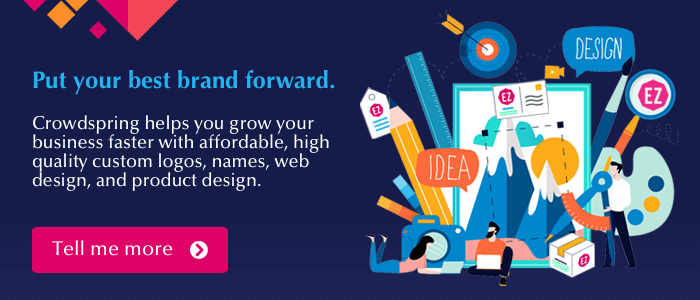

People judge others by their appearance and often pick the products they buy based solely on the packaging design for those products.
Good product packaging design acts as an ambassador for your brand.
Bad product packaging can make a great product forgettable.
If you haven’t created new product packaging in years, or are planning to release new products this year, you should know modern packaging design trends.
Here are the 10 biggest packaging design trends for 2022:


1. Creative fonts
People identify products based on the name of the brand and product. So, make sure the names are clear and easy to read.
You can hook shoppers by using creative fonts in your packaging design.
For example, the ever-popular Coca-Cola font will always be a classic. The font is simple, straightforward, flowy, and easy to read. Even when we see that font from a distance, we can often tell that a person is drinking Coca-Cola just by seeing the font along on the company’s classic, red background.
It indeed took Coca-Cola many decades to create this strong association in the minds of consumers. But you can do something similar by picking smart fonts that differentiate your product packaging.

For example, if you want a minimalist look, use bold and large font for your product name and use one color for your background. Minimalist product packaging design remains popular.
If you want to get more creative with your packaging design, include small designs or patterns in your packaging that match a vibrant and loud font.
2. Transparent packaging
People appreciate it when brands are honest and transparent.
Successful brands have embraced this philosophy.
In product packaging, transparency means being honest with customers. Your packaging should thoroughly and clearly list the ingredients in your product. It should also mention if the product contains ingredients that might be harmful to some people.
Transparency also can include using product packaging to tell your brand story. For example, if your company actively participates in social issues like climate change, use product packaging to share why the topic is essential. You can include a small paragraph on your packaging explaining your brand’s advocacy.
Transparent packaging design creates a sense of trust and connection to your brand.

3. Simplistic designs
Sometimes the best way to stand out is to be simple.
People assume that anything funky, colorful, loud, or bold will always get attention.
But in product packaging, that’s not always the case.
Simple packaging designs emphasize brand authenticity and have a flawless and timeless look.
And, you will usually spend less energy and money designing your product’s packaging too.
Companies like Apple and Anker, for example, use simple packaging that focuses on their branding instead of the product. Many other companies do the same, including popular soda, electronics, cleaning products, and other brands.
People can develop a sense of trust when they see simpler packaging. Because there’s less to see, consumers can focus on essential product details. In this case, less can be more.

4. Secure packaging
We saw increasing use of secure packaging design over the past several years. People have been concerned about safety, and companies have responded by making packaging more sanitary, safe, and secure.
For many products, especially food and beverage products, this has become the gold standard of product packaging.
But remember that it’s easy for packaging to look too simple when you value product security more than the design.
The good news is that you can do both. You can create secure packaging that’s also fun.
For example, use bold colors, minimalistic or bold fonts for your brand name, showcase your company logo, and incorporate other small design elements into the packaging to add extra personality.
Adding this last fun bit into secure packaging design adds an extra touch of love when your customer sees the packaging. And it can often make people smile.

5. Colorful and loud packaging
Scientific studies show that colors influence people and affect our moods.
Clever designers, marketers, and business owners use color psychology to influence everything from logo design to website design to packaging design.
For example, Facebook and Twitter use blue as their primary brand colors. We do the same at crowdspring.
Blue is easier on the eyes and is associated with relaxation.
In contrast, bright colors such as orange, red, yellow, and others create a feeling of fun and joy. Those colors are often used on eCommerce sites.
So, if you want to show positivity and fun through product packaging design, use loud colors!

6. Humorous illustrations
Many videos and posts become viral because they make us laugh.
You can do the same with product packaging design.
It’s easier to hook shoppers with your packaging if you can make an instant connection with them. One of the fastest ways to create that instant connection is through humor.
You don’t have to create purposefully funny designs or memes on your packaging. A fun, easy-to-understand, and well-designed illustration can be effective.
Many brands collaborate with popular cartoon shows to include characters from those shows on packaging design.
Seeing familiar characters on the packaging, primarily when those characters are known for being funny, creates an instant connection that will lead people to buy the product.
Small businesses don’t have huge budgets. Most small companies can’t partner with Rick and Morty for product packaging design.
But they don’t have to spend big money to follow this trend. You can design a funny or exciting custom illustration that aligns perfectly with your brand.
But do this only if humor is relevant to your brand strategy. Humor is great, but it’s not appropriate for all brands or at all times.

7. Packaging that tells a story
Nothing beats a great story. Stories engage people and create more trust and connection to brands.
Products alone can’t tell stories. It would help if you created innovative packaging that complements your products.
There are many ways to tell your brand’s story through packaging design. For example, if you make a beverage, you can design a comic series illustrated on your product’s packaging. Then continue the story and keep people engaged with new product releases.
Stories, especially on product packaging, can also play an influential role in strengthening your company’s brand identity.

For example, Divine’s chocolate bars (above) prominently feature their opulent gold script logo. This reminds customers of the high-quality and decadent chocolate experience awaiting inside.
The logo is printed in raised metallic ink, providing a tactile experience for the consumer and a visual one.
And surrounding that logo is a pattern of adrinka symbols. These symbols derive from Ghanaian culture and are still embraced by the Kuapa Kokoo cooperative farmers.
Each symbol represents a virtue that the brand values.
And that’s just the outside of the wrapper. The inside of Divine’s wrappers includes copy and graphics explaining their story.

8. Use of QR codes
People value brand authenticity. Gen-Z and Millennials will often only buy from authentic brands.
That’s why you should ensure that your packaging complements your messaging.
Counterfeit products have become difficult to distinguish from the original product. Companies like Amazon constantly struggle to find counterfeit products within their product listings.
QR codes have become important to authenticate original products and brands.
But, QR codes can do more than authenticate a product’s originality.
QR codes can also tell your brand story. This will help you create a newfound connection and trust with your customers.

9. Vintage packaging
The last several years had prompted us to look back on what we used to do when life was normal. For some, this meant looking back five years. But for many, this meant looking back decades.
People love to look back on nostalgic things. We can see this trend on social media with the rise of retro designs, fashion, music, and more.
Many brands have embraced this design style. Innovative brands created vintage designs that responded to this trend.
People love vintage designs for their historical value and because vintage designs can be a sweet spot between old and new without looking awkward.
Vintage design styles are familiar, sleek, and arguably timeless. They are appropriate in many situations.

10. Sustainable packaging
Many people, and especially Gen-Z and Millennials, prefer environmentally conscious brands.
For example, people increasingly prefer recyclable and reusable products and packaging.
Designing packaging to be sustainable and reusable can meet this growing demand.
Sustainable packaging creates a mindset that a purchase can help the environment. And sustainable packaging can also help promote environmental consciousness.
Your customers will love this added sense of community and positivity.
Packaging design trends change based on people’s demands, tastes, and needs. So, if you haven’t updated your product packaging in a while, this is the perfect time to do so. Create packaging designs that perfectly represent your brand and product by fostering a sense of trust and community with your customers.
Want a closer look at all design trends for 2022?
Top 10 Logo Design Trends for 2022
11 Biggest Web Design Trends for 2022
10 Biggest Packaging Design Trends for 2022
10 Top Book Cover Design Trends for 2022
12 Hottest Marketing Trends of 2022

